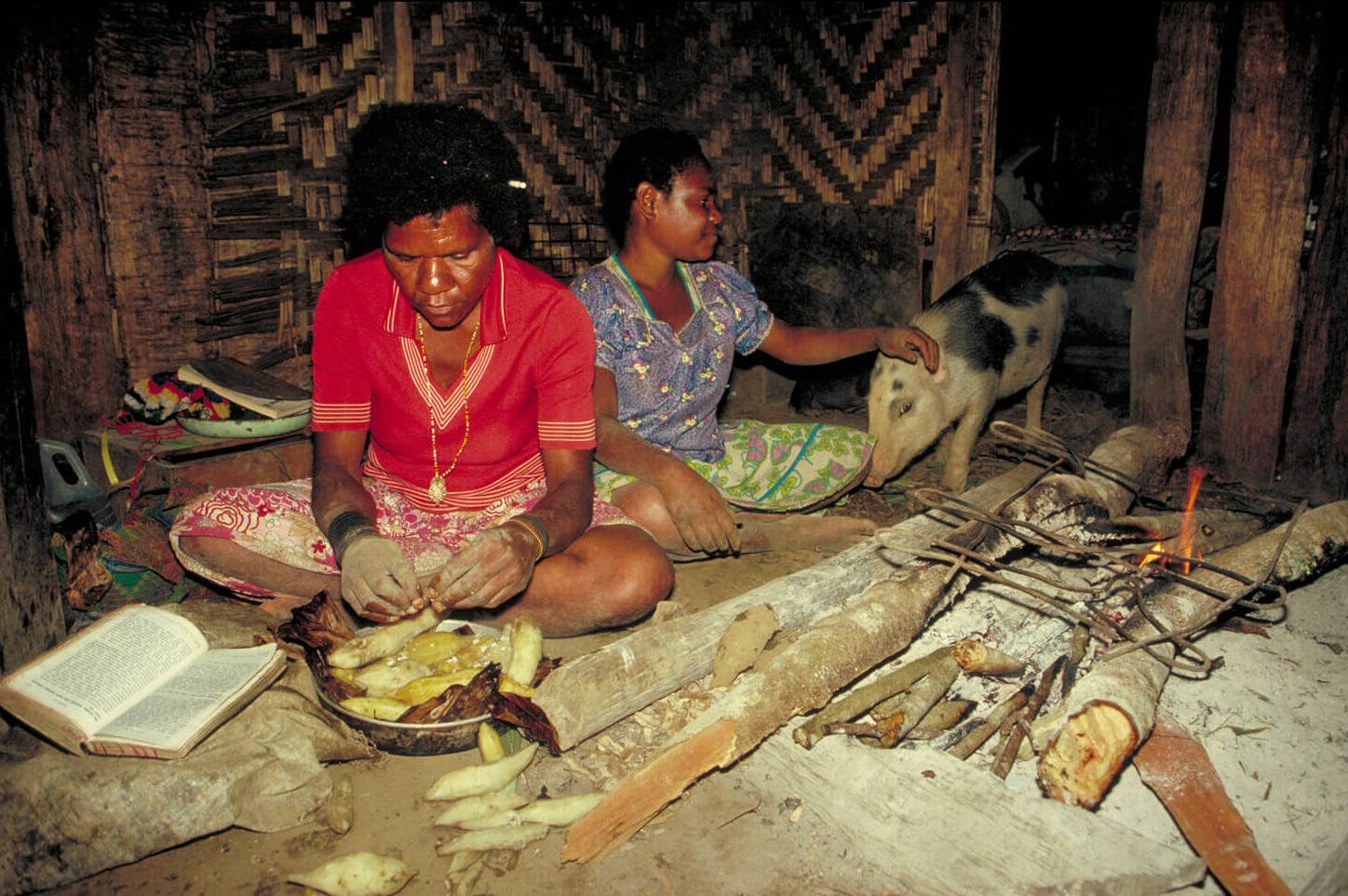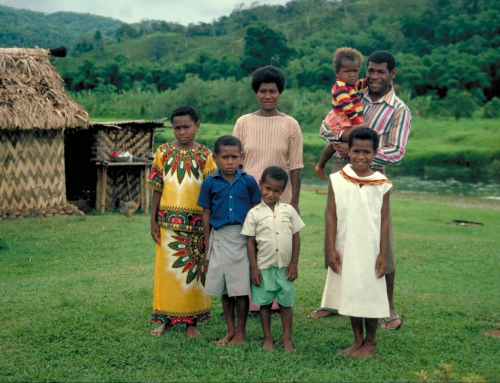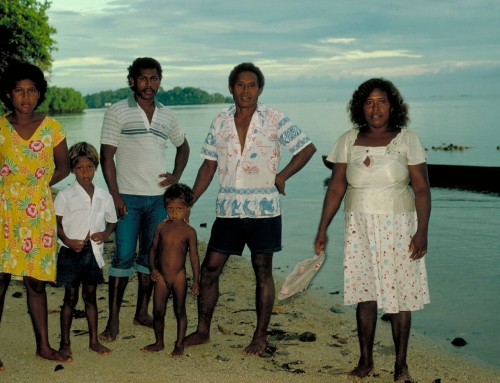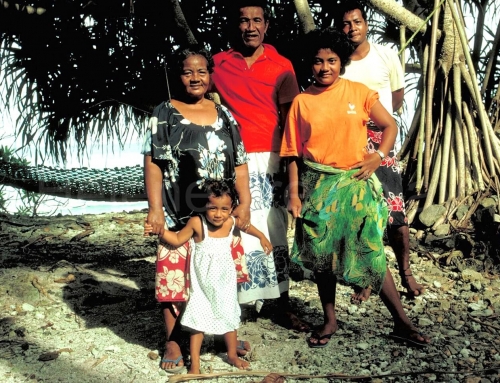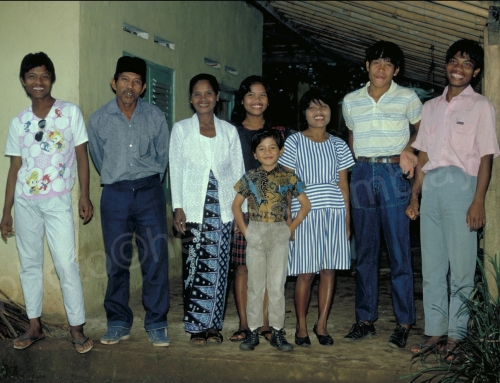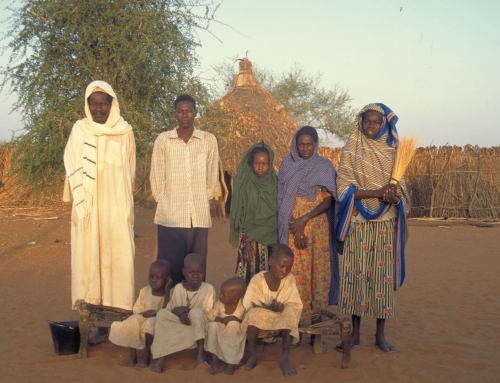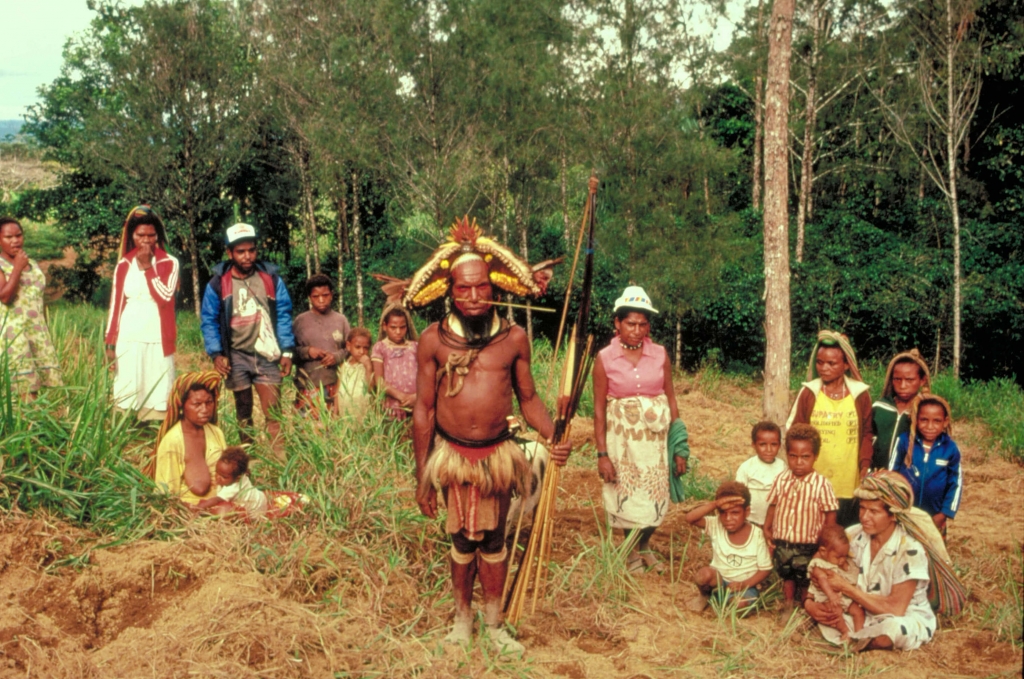
23 cows
14 pigs and 34 piglets
*Homoko Alembo’s family do not know their ages; they are members of the Huli people.
Homoko Alembo*
Lunama (Lus) (wife)
Mule Melin
Eralia (Agnes) (wife)
Marira (wife)
Pandai
Akai
Atapa
Apili (wife)
Wawali
Landame (wife)
Her daughter
Her sons: John,Pirape, Mariam, Piralu
PITAPAYA April 25th 1988
At 2,500 metres, it is cold in the morning
The tree cane huts that house the fives of Homoko Alembo are still in darkness. In one, Lus gets up from the elevated cane bed where she has slept with her daughter Mule Melin, blows on the embers of last night’s fire, then opens the door. At 2,500 metres, it is cold in the morning in the highlands of Papua New Guinea. The three piglets that have slept under Lus’s bed scamper outside to join the 13 kept in the tiny pig shed.
Lus brings her pigs into the fields and ties them so that they will turn the earth for the next planting, as they dig with their snouts for left-over sweet potatoes. Then they’ll be moved to “plough” another section.
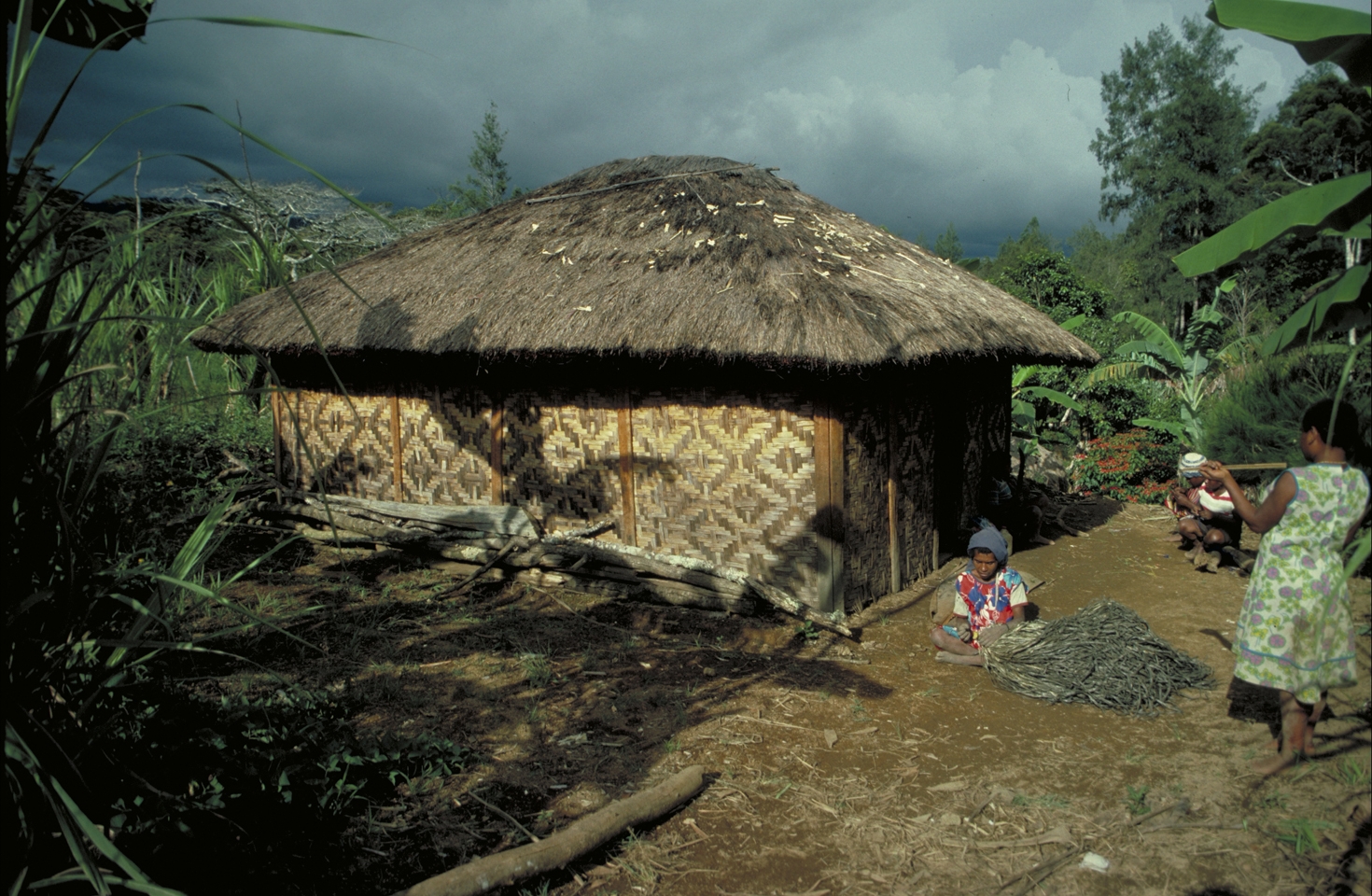
Agnes is the youngest and the most rebellious of the five wives.
6:30 In the next house, Marira, Apili and Landame, who share it, feed their seven youngsters and clean their running noses. They all have a cold, and pneumonia is the leading cause of death for children. In the smoke-filled house, there is no ventilation and absolutely no place to move; the sleeping platforms take up all the space.
In the third house, Agnes is alone. She has lost two babies shortly after birth and refuses to try again. Agnes is the youngest and the most rebellious of the wives. Tradition does not allow Homoko Alembo inside his wives’ houses. He talks with them at the door; if he wants to meet with them more privately, it is in the forest. Agnes has not been answering her husband’s calls; he must run after and she disappears, laughing.
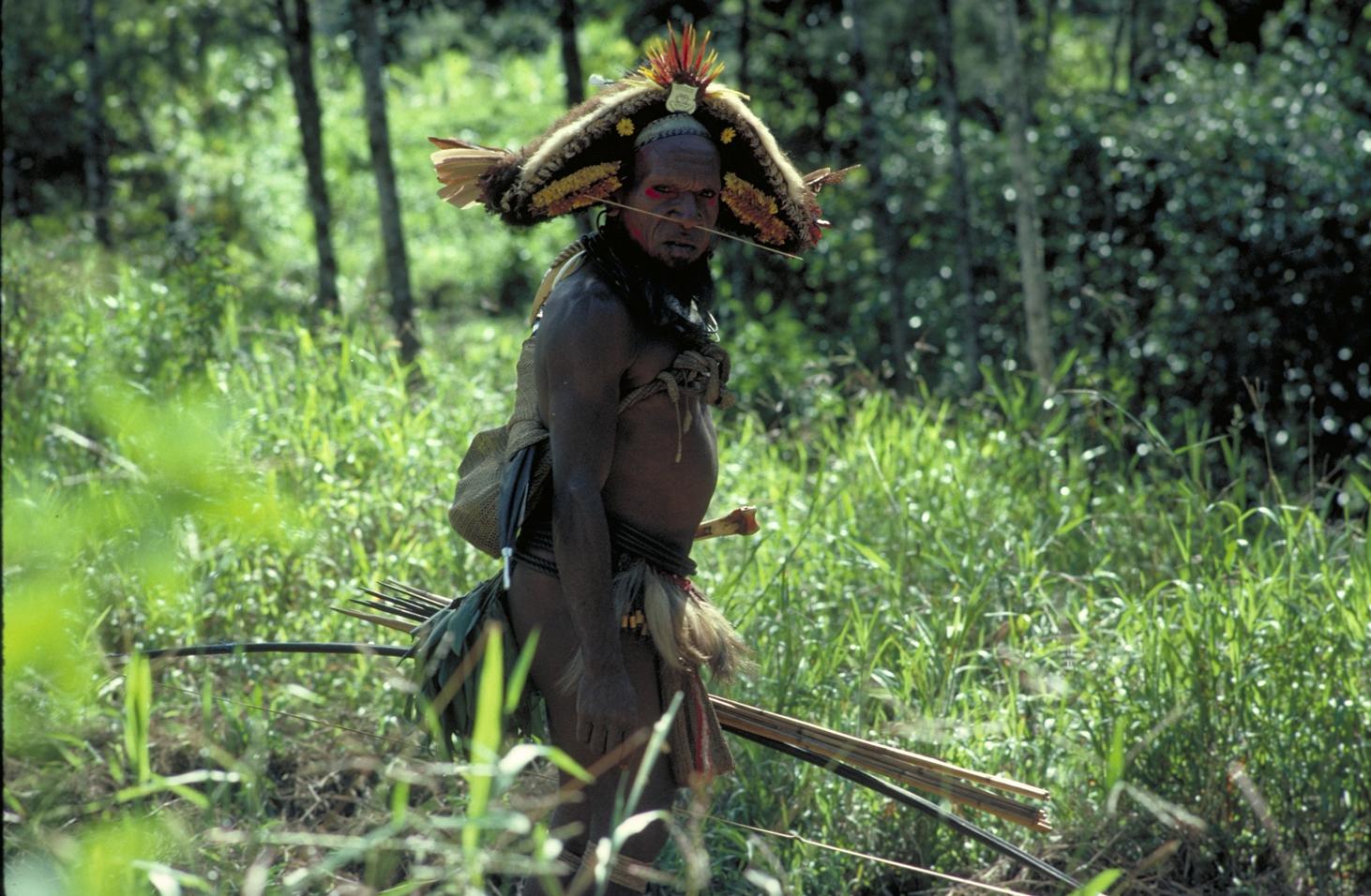
Homoko Alembo shares a house with 12 related men and boys
Homoko Alembo is a good husband, say his five wives. “He lets us alone and does not call us when the children are small.” Abstinence, while waiting for children to be strong and the women able fully to work again. “But the other men break tradition” they say. “Some women have one child on the right breast and one on the left and are expected to keep all their children alive, work the gardens, and take care of the pigs.”
Homoko Alembo leaves the house he shares with 12 related men and boys to bring his 23 cows to graze further up the mountain, while his sons and relatives prepare sweet potatoes. Men live separately and are responsible for their needs and for teaching boys their most important skills – to protect their land, women, children and clan with the bow and arrow.
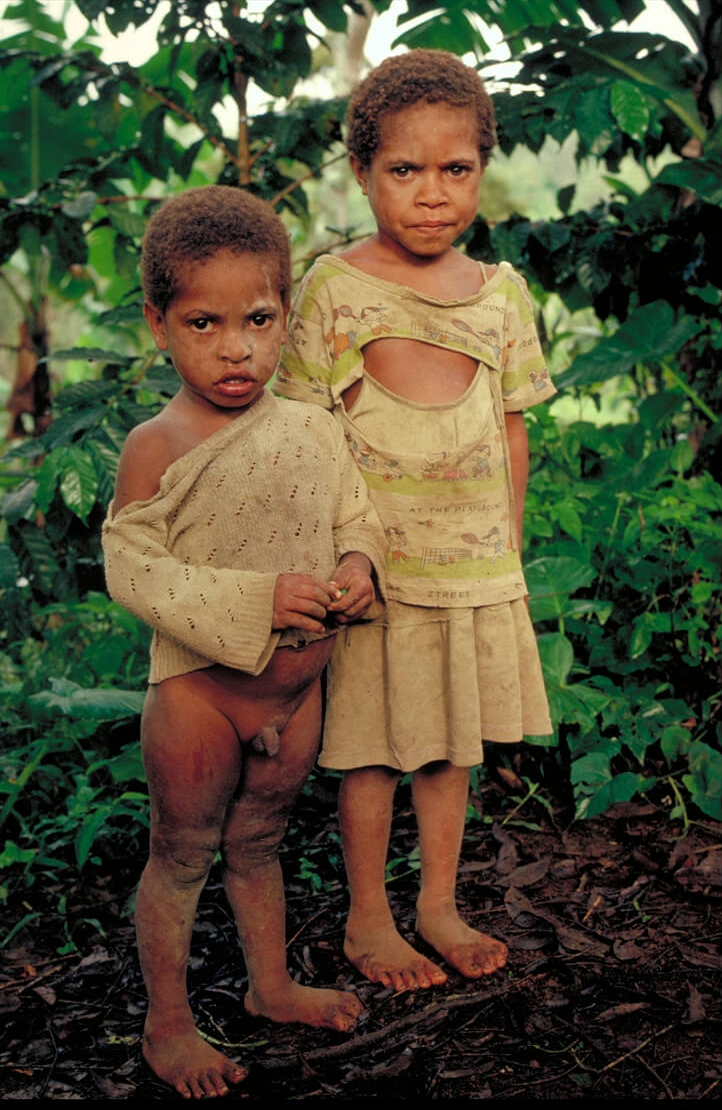
He does not know how many children he has
Homoko Alembo does not bother to keep track of exactly how many children he has. Four sons are alive; there are enough girls to sell to acquire more pigs; and he has important things to do. Chief of his clan and chancellor of 13 clans, he represents the people to other clans and to the district authorities. He relays government agricultural advice to his people and tries to keep peace between clans. The Huli are the most rebellious of the country’s mountain people and tribal wars are increasing. The government would like to stop them. Already some guns have appeared and it is feared that the bow and the arrow may soon be replaced by more deadly weapons.
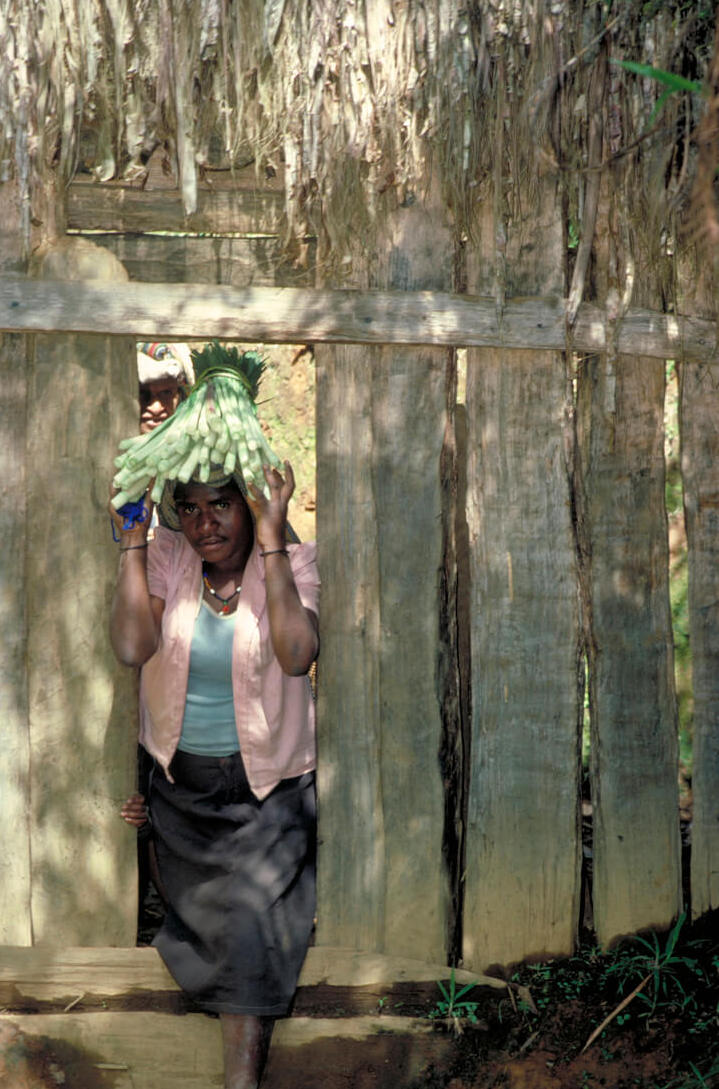
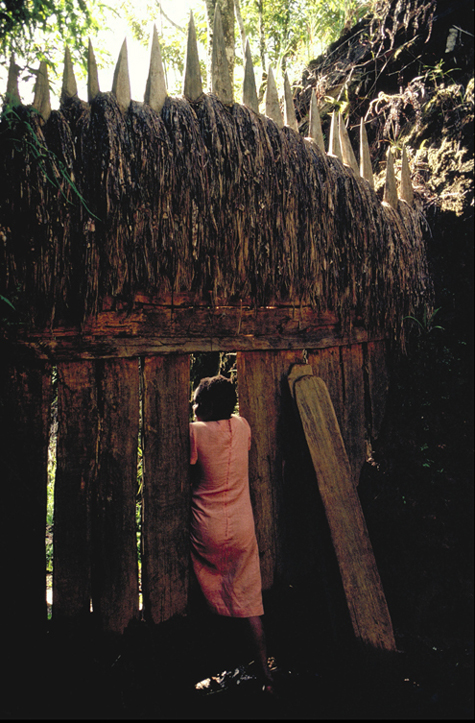
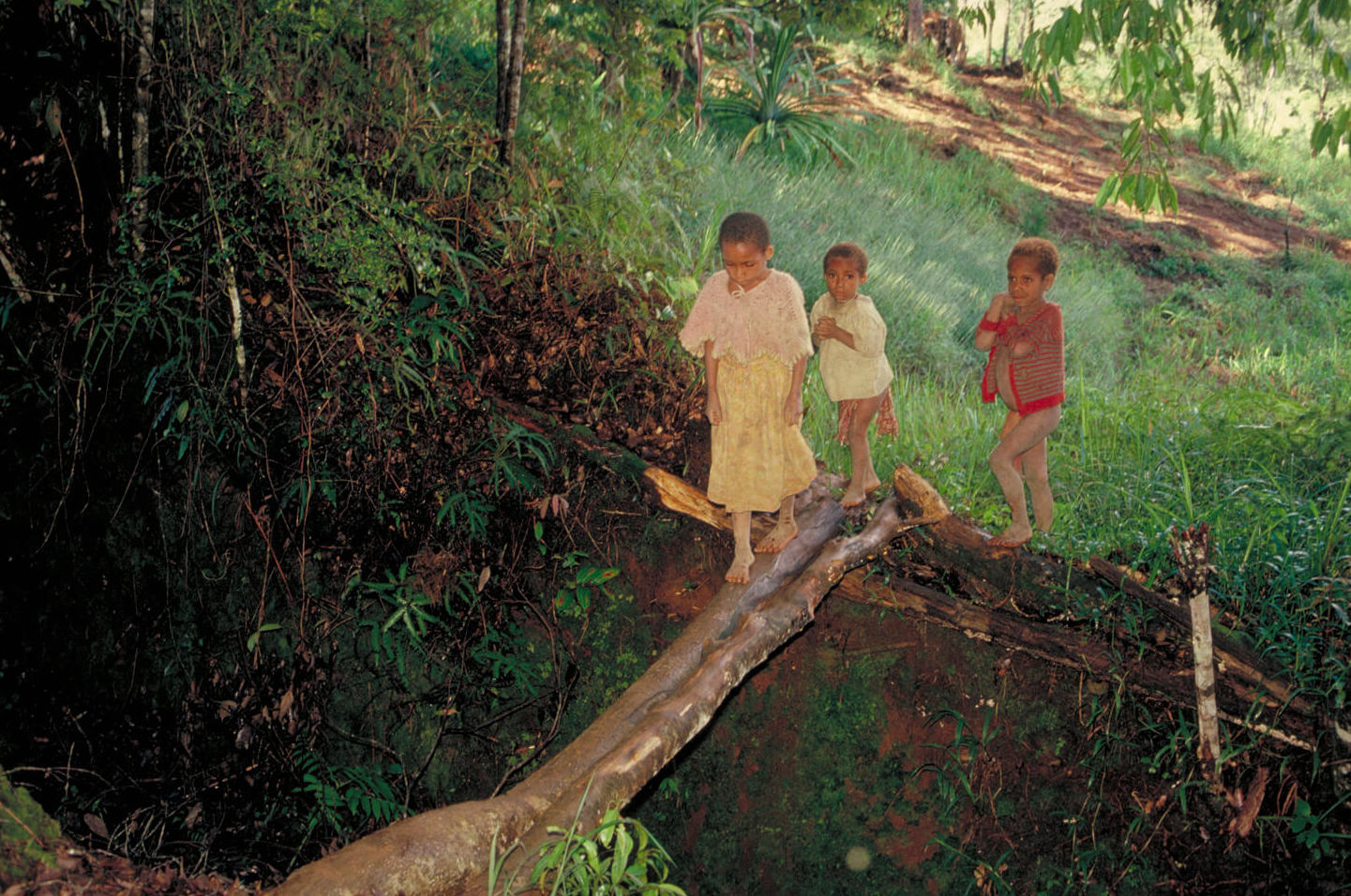
Protected by walls and trenches up to eight metres deep
8:00 This morning all seems calm; there has not been a war for four months. The clouds are lifting from the mountain tops, assuring another sunny morning; babies pull away from their mothers’ breasts with satisfied smiles. It is now time to get going. Marira and Apili will walk for more than 30 minutes to reach their gardens, while Lus, Agnes and Landame and a few children go to fetch wood and water from the nearby forest. The daily household work requires at least two hours of walking.
9:00 Each living area is protected by trenches up to eight metres deep. Lus, Agnes and Landame walk between them until they find the exit gates. Outside, they scan trees for dead limbs, climbing up to chop the branch down, then cutting it into smaller pieces on the ground. One hour later, Lus is up a tree when a voice echoes off the mountain. The women stop moving, the children stop yelling, even the baby stops crying.
From hilltop to hilltop, the wailing voice brings news which quickly changes the women’s expressions. A man of their clan has been killed; there will be war! “We must go back home and wait for our husband,” says Lus. Picking up the wood, they stop only to fill plastic containers with cool water at a mountain spring.
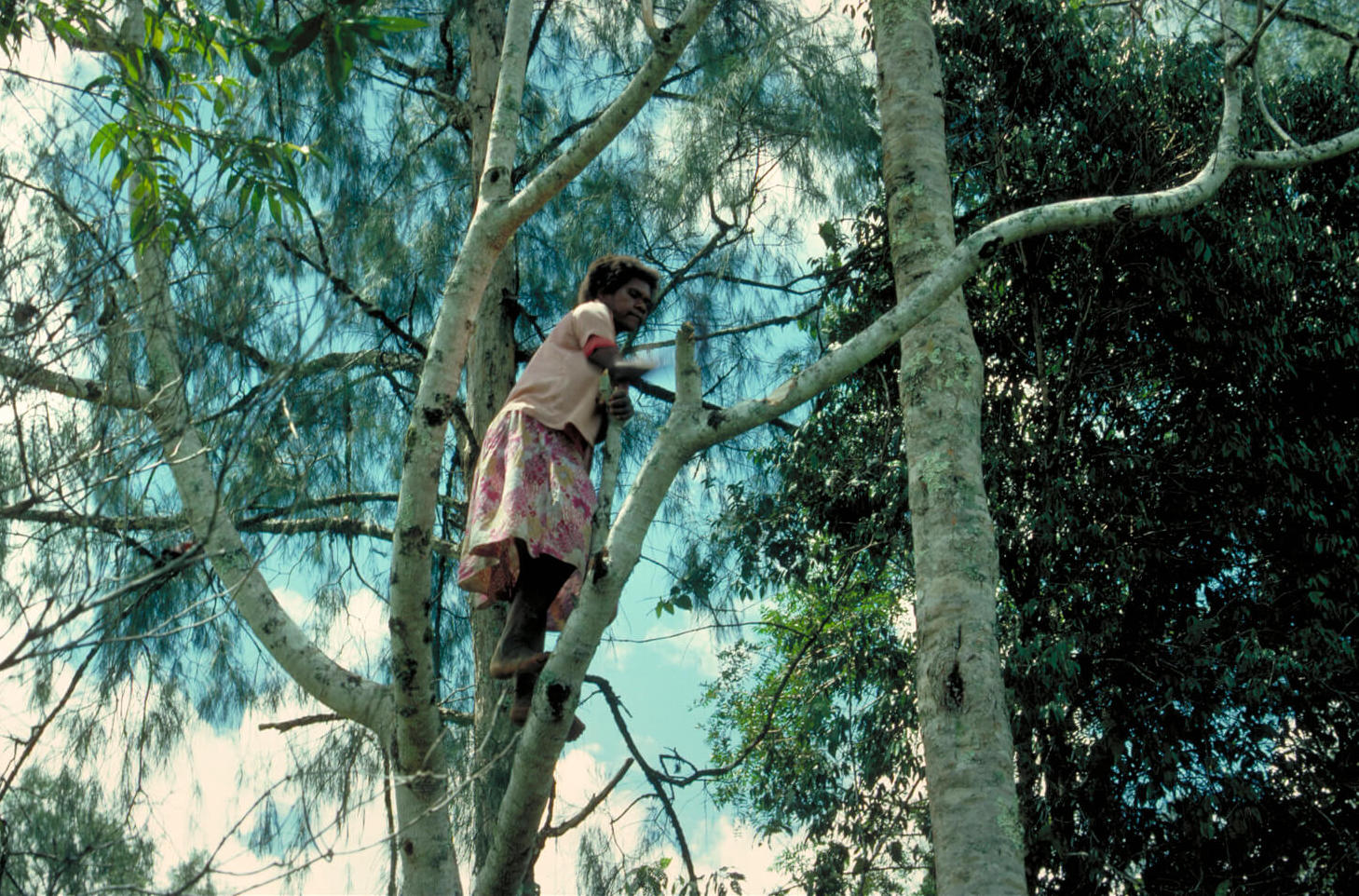
There is panic in each woman’s face
11:00 Marira and Apili have also heard the news while they were in their garden and have come to Lus’ house; the wives feel more secure together. There is panic in each woman’s face. Apili says she is scared; Mule is lamenting the killing. Lus is crocheting a new string bag; Agnes sits on a tree trunk, searching for lice in Marira’s hair; Marira, in turn, sits between Agnes’s legs while she searches her daughter Akai’s head below her. They talk and plan how to save the pigs if the men come to fight on their territory.
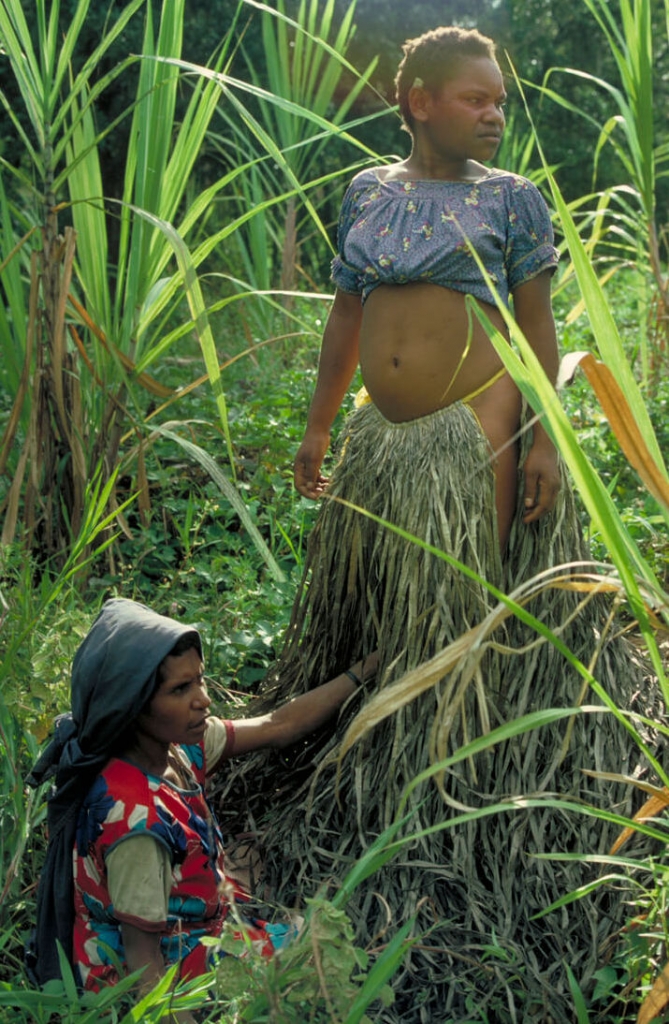
Suddenly Mule stops crying and smiles. Since there has been a death, there will be a funeral, the opportunity for all women to go and cry together. They will cover their faces with paint put on their grass skirts and meet along the road, walk together, and yell to the spirit of death to come and help their men get vengeance. All the women now seem happy and Mule brings out her skirt, washes it and sets it down to dry on the floor. Then, on her mother’s orders, she goes to move the pigs so they will be in the shade. “Our mothers, they tell us what to do: get the wood, the pigs, and the firewood. We don’t say anything, we do the work. That is the way it is here,” explains Mule.
“Women, stay silent and be ready to run and save the pigs.”
1:30 As on any other afternoon, the clouds come back to cover the sky and then lower to bring the afternoon rain. Lus has started a fire in the unventilated house; she can’t stop talking. Some men going by with their bows and arrows call out: “Wait, women, stay silent, do not go out of your gardens, be ready to run and save the pigs.” Some of these men live in the cities and work in government offices. But when there is a war and their clan is in danger, they come back and take up their bows and arrows again.
2:00 During the deafening thunder and heavy rain, each woman has gone back to her own fire. In front of Lus, the sweet potatoes are cooking in the ashes. She reads the Bible and sings a “God’s song”, while her daughter Mule runs through the rain to move the “ploughing” pigs to a new part of the field.
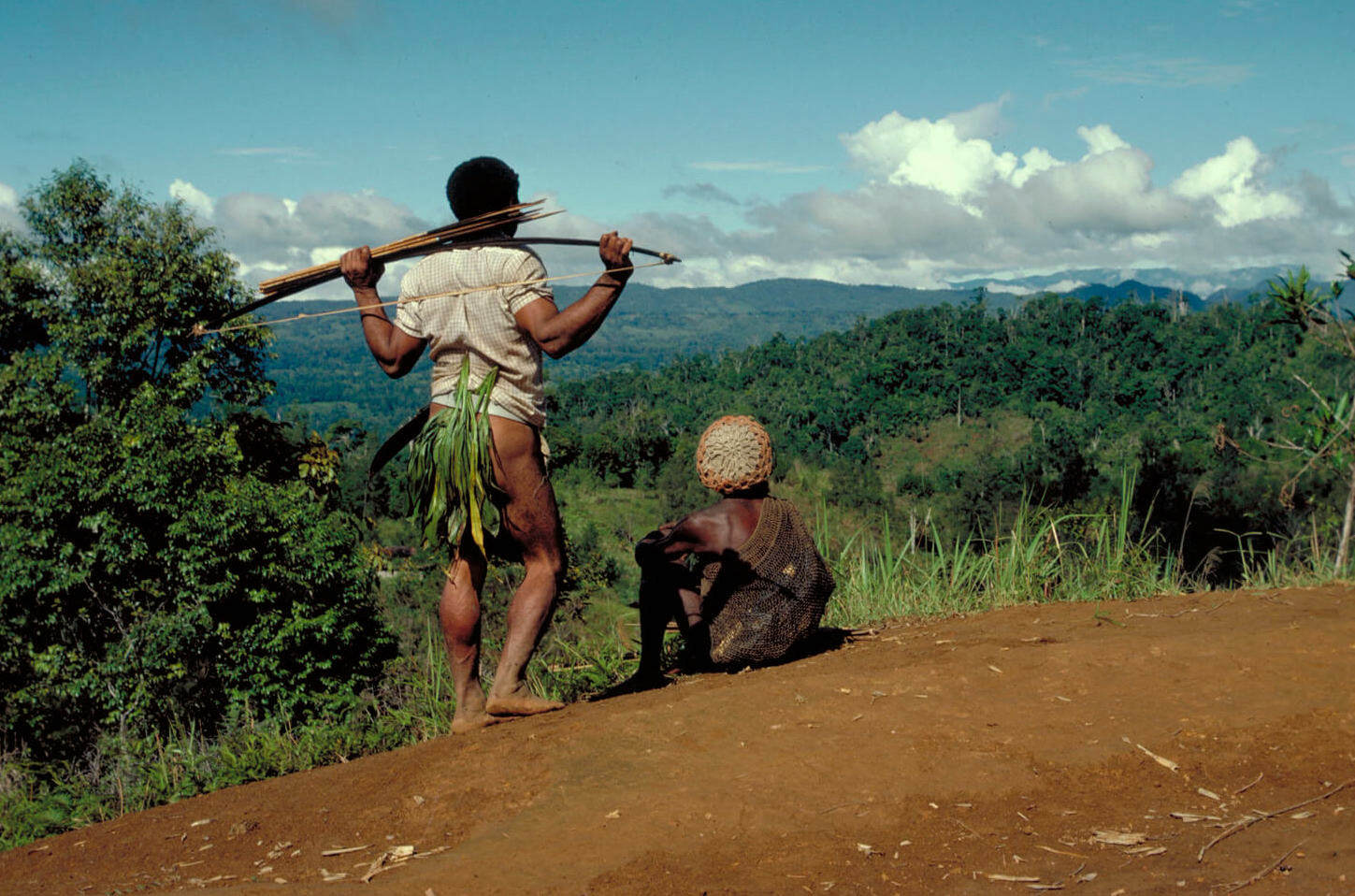
“They want war”
4:00 Homoko Alembo stops by his wives’ houses to bring them the news. The problem is serious. A week ago, a drunken man of the Ewara clan died in a car accident, but as the Huli believe in sorcery, the clan did not accept the doctor’s autopsy verdict. They have accused Homoko Alembo’s Pitapaya clan of casting an evil spell on them and when he tried to talk to the “big men” of the Ewara clan, they refused to hear him – or the police. “They want war,” he says, “and in retaliation they killed the son of my brother yesterday, hitting him on the forehead with an axe, and now today an old man with an arrow usually used to kill pigs.” Homoko Alembo’s clan now also wants battle, because the Ewara clan has broken unspoken rules of war: not to kill children, women or old people, and never to kill someone by hitting them in the face. So there will be a war, and he tells his wives: “Stay home, women: do not go far; and yes, you must all go to the funerals.”
Homoko Alembo then goes off with the men to plan for the war. Tomorrow they will split into gangs and hide throughout the forest to protect their territory.
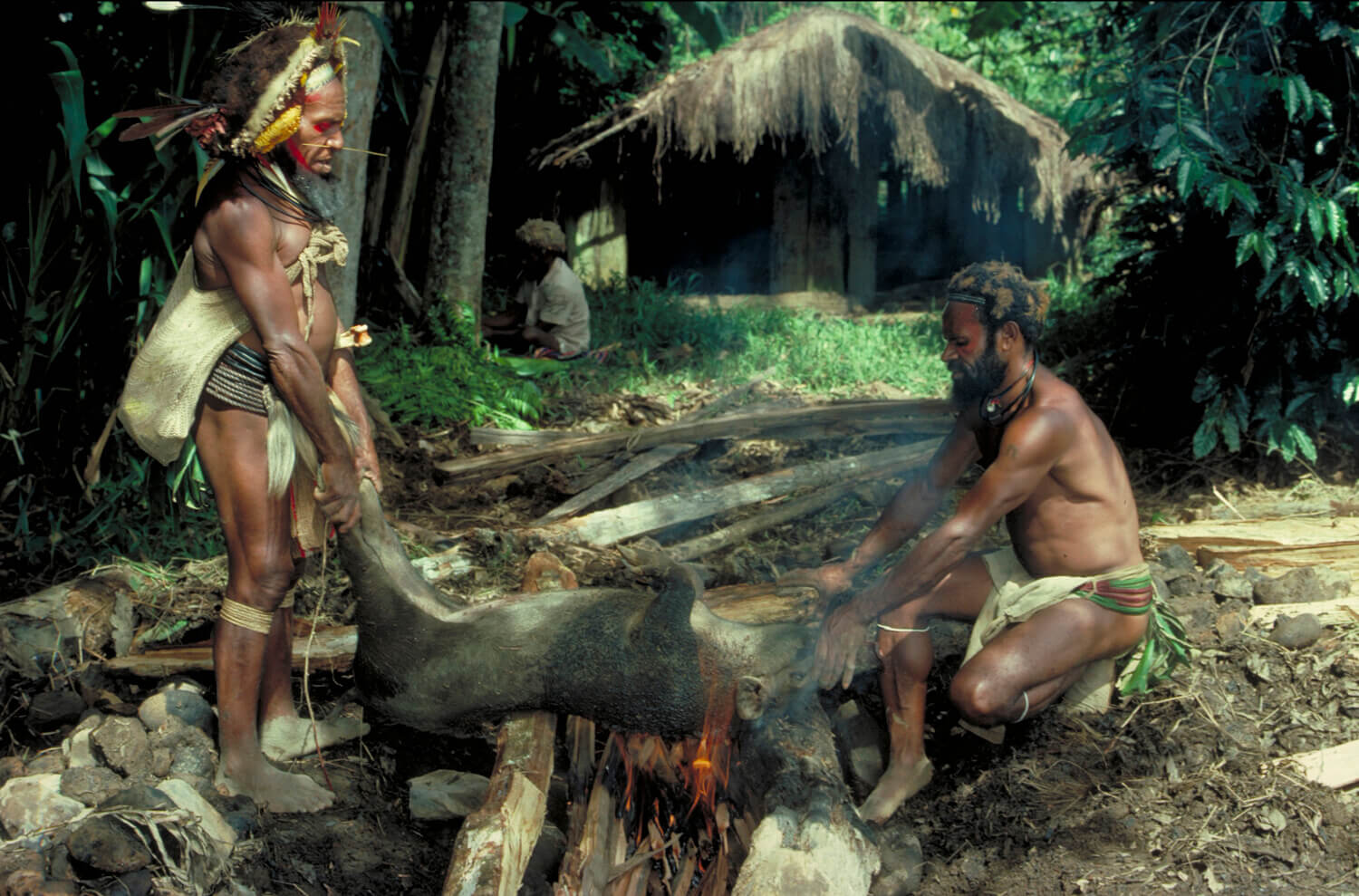
“I hope they don’t come and burn our houses”
5:30 The women go and get the pigs and bring them in for the night. Lus brings the three piglets near the fire and Mule happily takes one in her arms while her mother prepares their food.
7:00 It is dark and cold in their houses and the women sit in the smoke on their dirt floors, trying to calm the cries of their hungry children and Lus’s three piglets. Outside, Mule calls her mother and Agnes. On the mountain, houses are burning; the Ewara clan is still at work. “I hope they don’t come and burn our houses,” says Lus. “Last year they did.” The fear is justified; the clans have even made a road sign telling the police to stay out of their war.
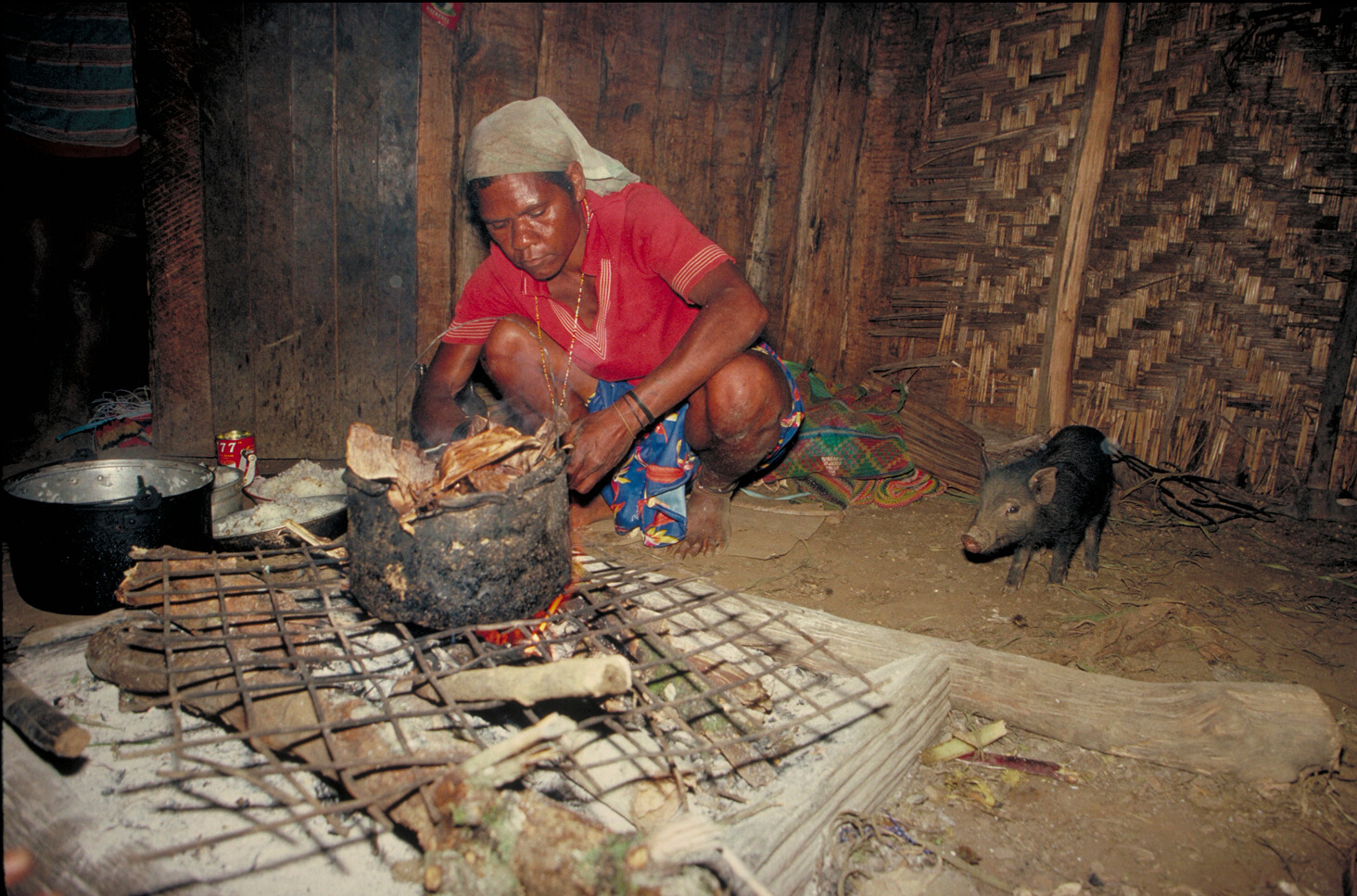
The 3 piglets are already snoring
9:00 Agnes decides to stay with Mule and her mother. She will feel better not being alone. The piglets are already snoring under the small platform when the three women cram together on it. They fall asleep quickly. With luck, not all rules of war will be broken, and if the warriors come and burn their house, they will wake them and let them out before doing so.
